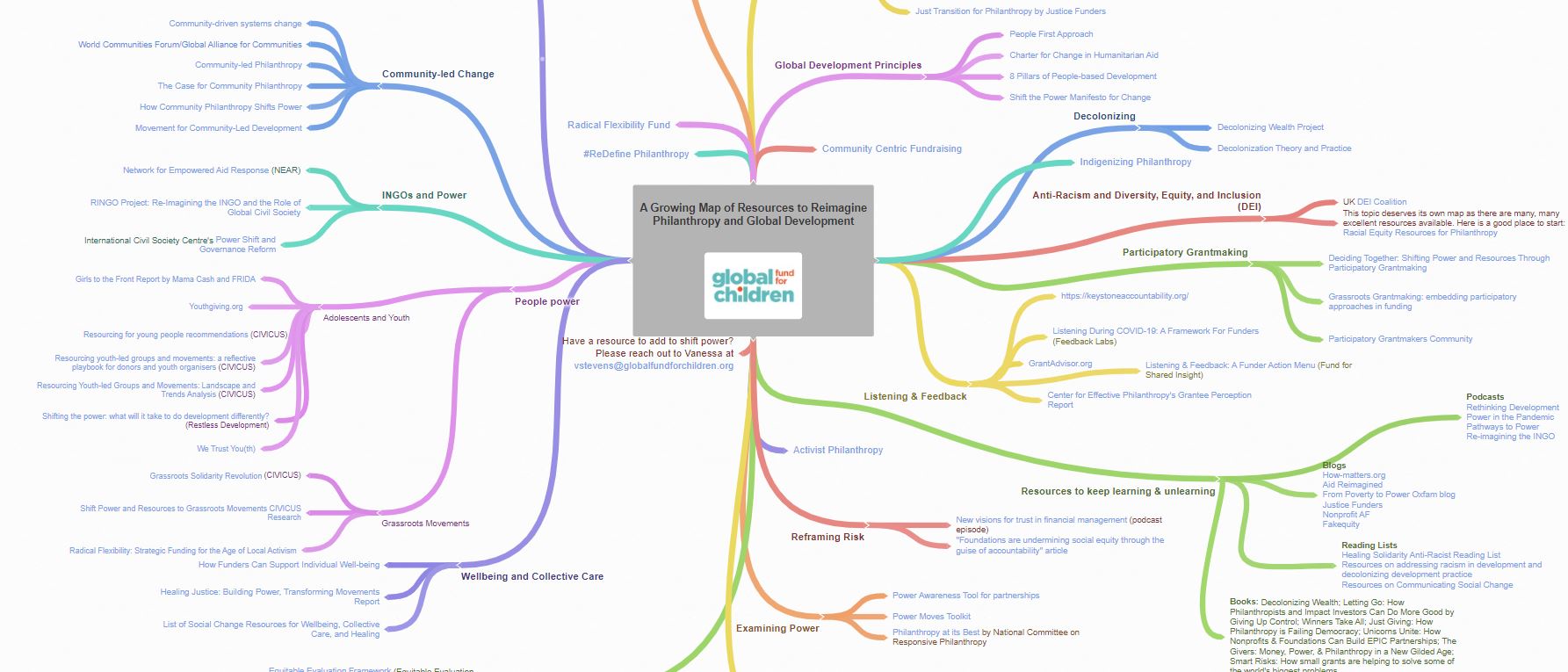Every choice we make in philanthropy is an opportunity to move toward trust, equity, and justice. There are many pathways for change and when I became a grantmaker at Global Fund for Children in 2018, I began to map the sector’s many emerging initiatives and resources.
Building the map was immensely helpful for my own learning, for finding allies, and for guiding our organizational commitments. Along the way, I shared the map with peers as they wrestled with similar questions in their institutions and in the sector as a whole. Below I highlight some key pathways for change as a starting point to explore the map and your change efforts. I invite you to share additional resources in order to create a more expansive re-imagination of the many choices we face in philanthropy.
Align values and practices
What gaps exist between your institution’s values and practices? Over the past several years, funder networks have developed grantmaking principles and pledges as calls to action. From human rights to feminist to trust-based principles, among others, they are all explicit about power and the need for changes in internal cultures and practices for philanthropy to address systemic inequities.
Disrupt philanthropy’s extractive nature
What are your commitments to recognize and address philanthropy’s extractive history? Like many sectors, philanthropy is also grappling with its legacy and with how racism, oppression, and white supremacy culture show up in our institutions. Growing commitments to regenerative practices, decolonizing and indigenizing philanthropy, and anti-racism build on important efforts to centre diversity, equity, inclusion, and accessibility.
Listen to your grantee partners
How do you centre the voices and experiences of your grantee partners? Tools like the Center for Effective Philanthropy’s Grantee Perception Report, GrantAdvisor, and Fund for Shared Insight’s Funder Action Menu provide mechanisms to solicit and act on feedback for responsive grantmaking.
Look beyond philanthropy
Where do you seek answers? Far too often grantmakers only listen to other funders, primarily those also in the Global North. The calls to #Shiftthepower catalyzed by the Global Fund for Community Foundations have united civil society actors in the movement for people-led development. Civil society initiatives like the Network for Empowered Aid Response (NEAR), Grassroots Solidarity Revolution, We Trust You(th), The RINGO Project, and the Global Alliance for Communities are all efforts to form more equitable partnerships by centring grassroots actors and local communities.
Transform power through participation
Who has decision-making power in your organization? There is growing momentum to break down barriers to participation to increase decision-making power in the hands of communities. Funders, both local and global, now have a learning space with the creation of the Participatory Grantmakers Community.
Invite all your colleagues to be part of change
Who is missing from these hard discussions? Power is embedded in all parts of our organizations, and philanthropy must look beyond its leadership and program officers to include colleagues in communications, development, finance, and operations. Some spaces, like Healing Solidarity Collective’s #GlobalDev Communicators Connect and Community-Centric Fundraising, are emerging for people in roles outside program teams to reflect on their practices.
Move toward structural change
How are you questioning current structures in philanthropy? Much of how philanthropy operates hinges on rules and regulations created for a different era. Within the US, there are proposals to increase the 5% minimum distribution requirement for private foundations and to change regulations around Donor-Advised Funds to mitigate the growing concentration of wealth sheltered from taxation. Some foundations are sunsetting and spending down their funds. Others are challenging assumptions about risk and compliance. Some, like the Radical Flexibility Fund, believe philanthropy must look beyond grants and invest in a broader range of financial instruments.
Embrace new ways of being for new ways of working
How are you called to change? At the core of all these necessary changes is how we choose to relate to one another. The pandemic, racial injustice, and threats to democracy underscore the need to prioritize wellbeing for social change to thrive. Philanthropy must act in solidarity. Follow the lead of Global South feminist funders centring relationships, interdependence, and healing to foster transformative ways of working.
In philanthropy, we have never faced so many questions and calls for change, but we also have never had as many possibilities with myriad resources and allies. I invite you to explore the map and find the resources that speak to you and those that challenge you. Depending on where you are on this journey, I hope this map inspires your first step, your next bold idea, or a new collaboration that continues to re-imagine global philanthropy.
To add a resource or initiative to the map, please contact the author at vstevens@globalfundforchildren.org.
Vanessa Stevens is the Director of Innovation and Influencing at Global Fund for Children.




Comments (1)
They are all explicit about power, and the need for changes in internal cultures and practices for philanthropy to address systemic inequities.